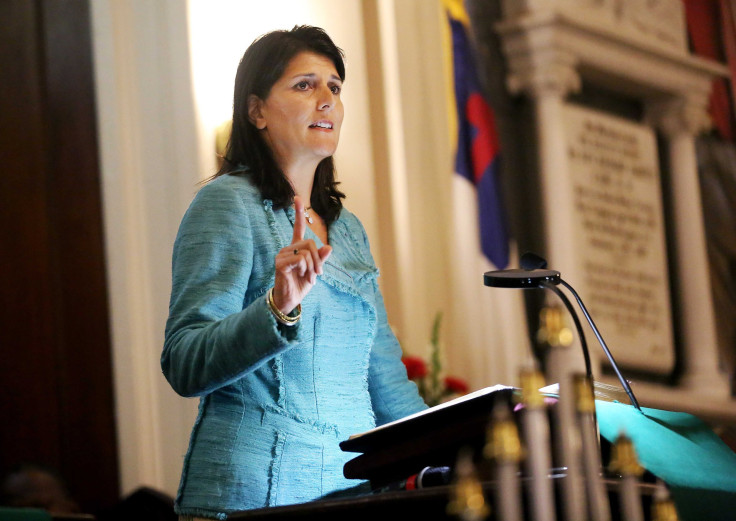Nikki Haley For Vice President? South Carolina Governor's Future Unclear After Confederate Flag Speech

Rumors were flying this week that the GOP could be eyeing South Carolina Gov. Nikki Haley to be its vice presidential candidate after her handling of the June 17 Charleston shooting and its aftermath. Politicians and pundits alike applauded Haley, a 43-year-old Indian-American, for raising bipartisan support to take down the controversial Confederate flag from state grounds. Some predicted the buzz could carry over into a 2016 nomination.
"Her VP stock is probably on the rise again at the moment," Republican analyst Ford O’Connell told the Hill, going on to say that she could appeal to young, female and minority voters -- groups the GOP has historically had trouble capturing. "She could stop the bleeding of women to Hillary Clinton," he added.
Haley held a news conference Monday to formally call for the removal of the Confederate flag from the South Carolina State House following last week's massacre of nine black churchgoers by white, 21-year-old Dylann Storm Roof. Although she'd previously defended the Confederate flag's flying at the statehouse, calling it a "sensitive issue" in 2014, she changed her position. "This flag, while an integral part of our past, does not represent the future of our great state," Haley said Monday.
The move attracted praise immediately, but it also fed speculation about Haley's future. Her term in South Carolina runs through January 2019, though many have wondered if she'll cut her time short to run in 2016.
Haley herself has remained quiet on the issue. After winning re-election last year, she wrote a statement that "speculation is just that." In 2013, at a campaign stop attended by GOP contenders Rick Perry, Scott Walker and Bobby Jindal, she was more specific, telling reporters her campaign for governor didn't mean "something national."
NBC News quoted an anonymous consultant who said Haley, whose past includes accusations of affairs and fluctuating approval ratings, could have trouble making it through vetting.
Overall, University of Virginia political scientist Geoffrey Skelley told the Post and Courier last year that Haley might be an unlikely VP nominee because South Carolina already leans conservative. "She's probably not a first-tier vice presidential candidate simply because she's from a very safe red state, and the eventual GOP nominee may be looking for a VP choice from a swing state," he said. "Much depends on who wins the Republican nomination."
© Copyright IBTimes 2025. All rights reserved.






















